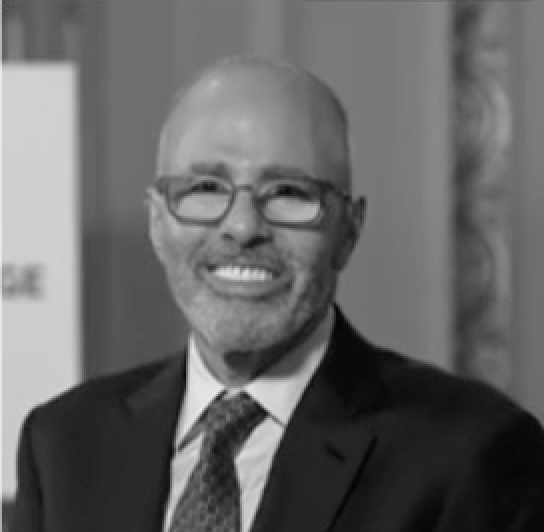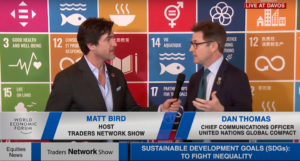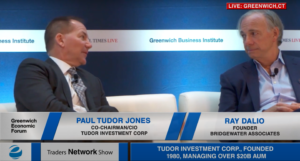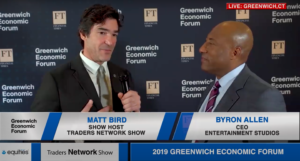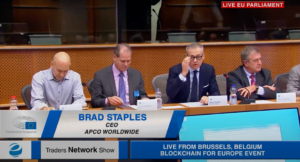Mohamed El-Erian, Senior Advisor at Gramercy Funds Management Discusses How to Survive the Inevitable Market Crash – Greenwich Economic Forum
Contributed by: Show Editorial Team
Tett and El-Erian discuss fronts threatening the world’s financial systems
Gillian Tett, Editor at Large at the Financial Times interviews Mohamed El-Erian, Senior Advisor at Gramercy Funds Management on capital market at Greenwich Economic Forum (Greenwich, CT)
It was beautifully sunny outside on the day when Gillian Tett and Mohamed El-Erian sat for a fireside chat at the 2019 Greenwich Economic Forum. But as Tett, an editor and editorial board member at the Financial Times, noted: “There are some major storm clouds gathering over the global economy.”
During the 30-minute conversation, El-Erian, a leading economic thinker and a senior advisor at Gramercy Funds Management, detailed a global economy facing an ominous future. At the time, populism was dominating our politics, the trade war with China was escalating under the Trump administration, and fears of a recession were very real, despite strong U.S. job numbers and a surging stock market.
Fast-forward to the present and the forecast doesn’t seem much clearer, even after the U.S. has transitioned to a Biden presidency. Populist sentiments continue to infiltrate elections, relations with China remain frosty, and a global pandemic has ravaged economies across the world. But, while we continue to hurdle toward the fog, El-Erian said there is reason to be optimistic about the economy—you just have to pack the right umbrella.
The conversation began with the U.S.’s escalating trade war with China, which was dominating headlines at the time of the 2019 forum. During the talk, El-Erian presciently predicted a superficial truce would arise, but he said it wouldn’t solve the primary issues. Indeed, early last year, the U.S. and China came to an agreement that reduced some tariffs and allowed China to avoid additional taxes while agreeing to purchase $200 billion worth of U.S. products over the next few years <<https://www.cnn.com/2021/01/21/economy/china-trade-tech-war-biden-intl-hnk/index.html>>. But the conflict is far from over. The Biden administration, while adopting a much more diplomatic tone, has shown no signs of softening the country’s relationship with China.
In 2019, El-Erian said the tensions between the two economic superpowers would remain because none of the underlying concerns were being dealt with. Intellectual property theft, forced transfers of technology and the unfair economic advantage U.S. companies have when setting up businesses in China must all be worked out if the countries expect to see real change, El-Erian said.
“These things are not being addressed in any sustainable manner,” he said.
In addition, because the economic dispute between China and the U.S. is wrapped up in conversations about national security threats, the impasse seems hard to break, El-Erian said. All of this affects global supply chains. Businesses in countries like Australia and Singapore could be forced to make a difficult choice between U.S. military protection or access to less expensive goods only available in China.
“Look what happened with Germany after the U.S. withdrew from the Iran deal,” El-Erian explained. “The U.S. ambassador brought together the CEOs of German companies and said, ‘I am not going to tell you how to run your businesses. I am just going to tell you the consequences of how you run your businesses. If you invest more in Iran, you’ll do less business with the U.S.’”
If heightening tensions result in a less globalized economy, instability could ensue, El-Erian said. He explained that the world economy has been on a road supported largely by central banks. Now, it seems, we could be reaching the end of that road. (To be sure, central banks have been a critical part of economic relief during the pandemic.)
El-Erian described that institutions in Western democracies have been hollowed out in the middle. Whether you’re talking about political systems, economic systems or market systems, “The center, the belly, is going down and the tails are going out.” In other words, we’re becoming more polarized, and populism is on the rise at both ends of the spectrum. Populism fuels anger, anger leads to one-issue voters, and one-issue voters tend to want to dismantle institutions, El-Erian said. “Bimodal distribution is an unstable distribution.”
But all is not lost, El-Erian continued. “The answer is you embrace this uncertainty, you embrace this bimodal distribution, and you understand that you have to do things differently.”
So what does such reform look like? El-Erian isn’t ready to champion Modern Monetary Theory—which, crudely, says governments that print money can’t run out of it and can therefore fund programs by taking on more debt—but he does believe there are insights to be gleaned from MMT. Basically, El-Erian said, central banks need to rethink their relationship with debt and what that means for financial stability and viability. For example, El-Erian explained, there is a massive need for infrastructure in this country. If there is a way to fill this need and modernize our roads, bridges and power supplies, the future returns could make the initial added borrowing worthwhile.
“Do I take it as far as central banks should be complete agents of governments and simply decide for governments what they are going to do, or fund governments without any hesitation? No, I don’t take it that far,” he said. But, “If we have an investment driven stimulus funded by debt, I actually think it’s a good thing. If you can have growth enhancing from that financing, I’m all for it.”
Environmental, Social and Governance investing, as well as Green quantitative easing—the notion that central banks should only buy green corporate bonds—could be part of reform as well, El-Erian said. Still, he doesn’t see such a shift becoming the dominant strategy.
“Green QE is a combination of the insights of Modern Monetary Theory and the importance of taking climate change seriously. Could I see central banks establishing a facility here on the side to do this? Yes. Is it going to be a QE [quantitate easing]? No.”
Seismic shifts in thinking, such as embracing aspects of MMT and ESG investing, are likely to take many investors out of their comfort zones, El-Erian said. And when people are out of their comfort zones, the risk is paralysis. That’s why, El-Erian said, it is important to recognize and plan for changes before they shock the system.
“Embrace that we are out of our comfort zone,” he said. “Embrace it and you are going to find there are a ton of opportunities out there.”
PR and Media By: CommPro Worldwide
Link to original article: Here
(Written by Andrew Waite; Editing and revisions by Nicole Liddy)
All rights reserved to the Traders Network Show. No part of this publication may be reproduced, distributed, or transmitted in any form or by any mean including; photocopying, recording, or other electronic or mechanical methods, without prior written permission of the publisher, except in the case of brief quotations embodied in critical reviews and certain other noncommercial uses permitted by copyright law. For permission requests, write to the publisher addressed “Attention: Permissions Coordinator”


